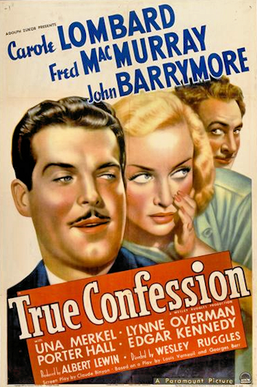 |
| Brian Donlevy and Glenda Farrell in High Tension |
Cast: Brian Donlevy, Glenda Farrell, Norman Foster, Helen Wood, Robert McWade, Theodore von Eltz, Romaine Callender, Hattie McDaniel, Joe Sawyer, Murray Alper. Screenplay: Lou Breslau, Edward Eliscu, John Patrick, J. Robert Bren, Norman Houston. Cinematography: Barney McGill. Art direction: Duncan Cramer. Film editing: Louis R. Loeffler.
High Tension is a lively little action comedy that comes in at 63 minutes, just right for the bottom half of a double feature. Brian Donlevy has the boisterous role of Steve Reardon, an underwater engineer for a transoceanic cable company who unwinds from his stressful job by getting drunk, telling tall tales of his undersea adventures, getting into fights, and messing around with his girlfriend, Edith McNeil (Glenda Farrell). It's a little hard to see why she puts up with Steve, let alone wants to marry him, except that she makes a good living writing pulp fiction based on those tall tales. Allan Dwan sets a nice pace for the movie, which puts Steve into a couple of knock-down, drag-out fights, one of which involves Steve and his opponent shoving a piano at each other in Edith's apartment. The more important fight, for the sake of the plot, comes when a couple of guys (one of them played by an unbilled Ward Bond) set upon him with the aim of picking his pocket. The movie's second lead, Eddie Mitchell (Norman Foster), manages to save the money that the thugs stole from Steve when he was knocked cold. Steve wakes up the next morning to find himself in bed with Eddie, who took him home for the night. It's the beginning of a beautiful friendship, with whatever homoerotic undertones you might want to find in it. Grateful for Eddie's help, and discovering that he has a degree from Caltech, Steve gets him a job with the company he works for and trains him to be his right hand man. Eventually, all this winds up with a some romantic complications, with Steve, who has broken up with Edith, putting the moves on Eddie's pretty secretary (Helen Wood), whom the shy Eddie secretly loves. And there's a big underwater rescue scene (done pretty much on the cheap) that sets everything straight again. The whole thing is quite watchable, except for the sexist and racist elements that don't go down as well today as they did in the '30s. Steve has to deal with his boss's prissy assistant, F. Willoughby Tuttle (Romaine Callender in a role probably written with Franklin Pangborn in mind), a prime example of the "pansy" stereotype that afflicted movies of the era. And Hattie McDaniel is cast as Edith's maid, unimaginatively named Hattie, a role that McDaniel plays with more sass and vigor than it deserves -- McDaniel was a true professional, and if you can overlook the stereotyping her performance is a delight.












